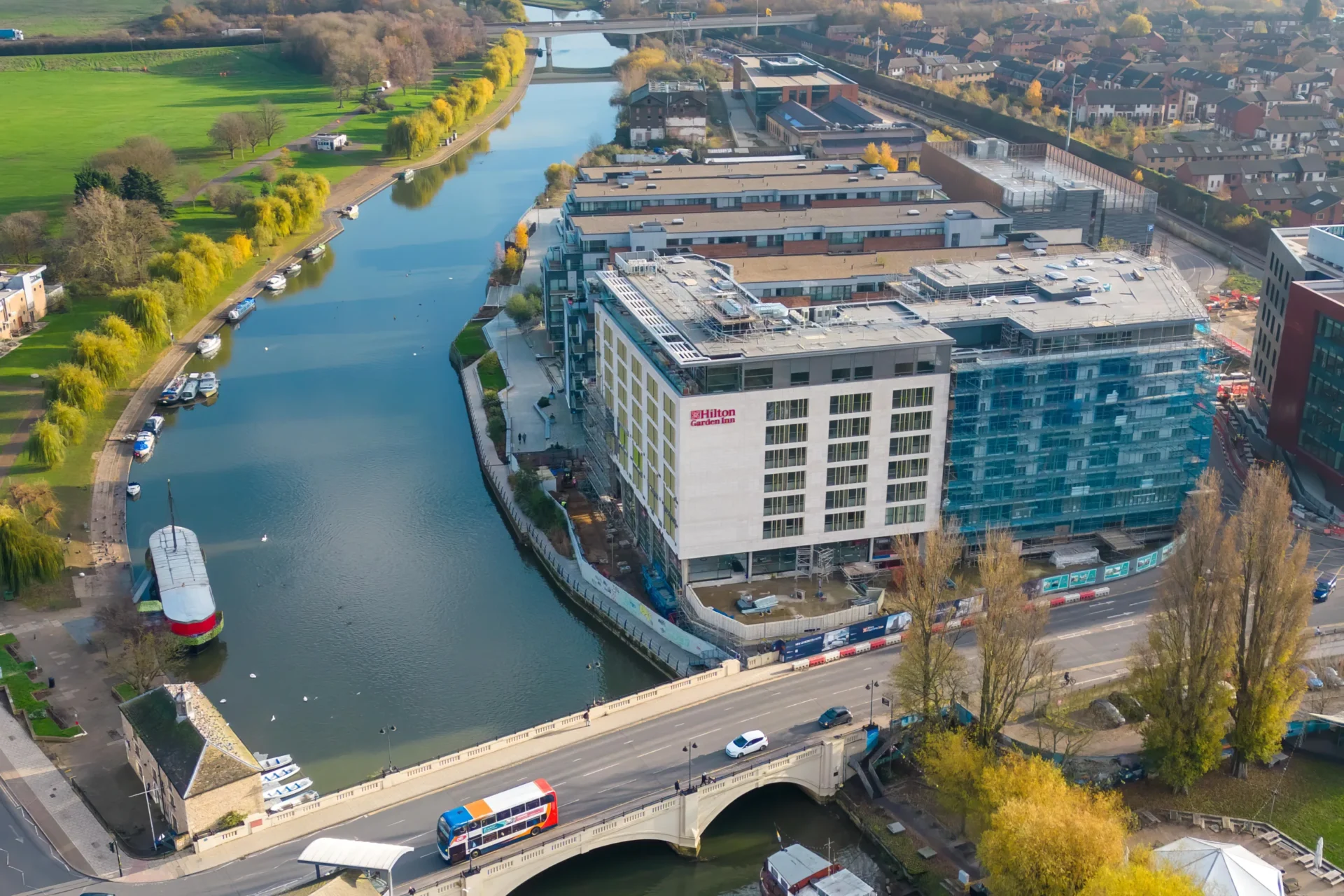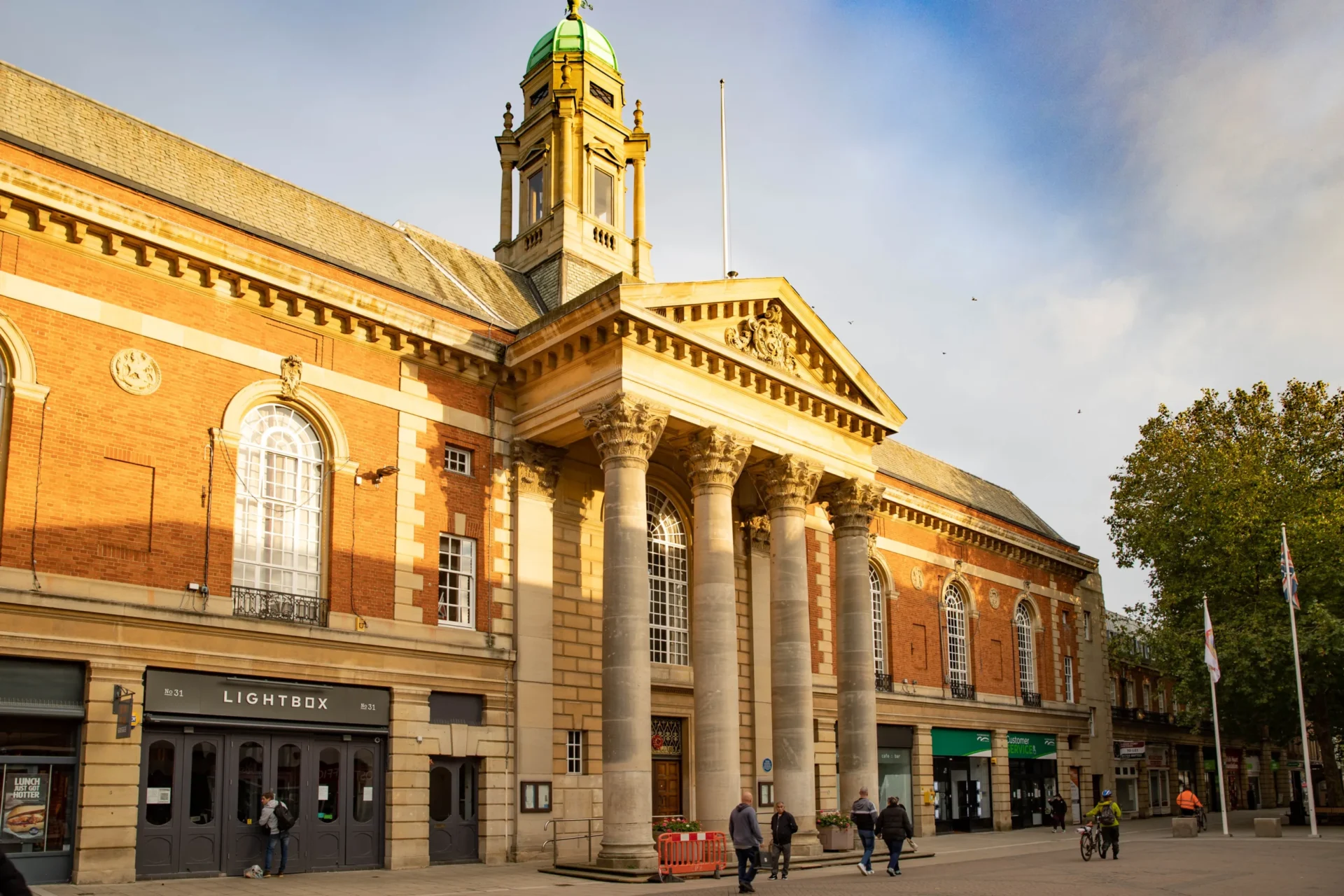New leader Mohammed Farooq faces one of his biggest challenges to date in trying to rescue the £15 million loaned by Peterborough City Council to finance the 160-bedroom Hilton Hotel at Fletton Quays. Councillor Farooq says, ‘it is regrettable that we are in this situation,” declining to blame any of his predecessors for the debacle of an unfinished hotel, and a legal landscape peppered with uncertainties.
An option to resolve ownership is under way and more may become clear in coming days and when a paper is presented to Cabinet on March 11.
It is a far cry from the optimistic outcome forecast in October 2017 when David Seaton (no longer a councillor) influenced his Cabinet colleagues to win approval for a £15 million over 24 months to kick start the Hilton Hotel development at Fletton Quays.
To make sense of now we must go back to then and to the decision by the city council to agree the loan with Norlin Hotels Holdings Ltd to build the hotel.
As no ‘call-in’ had been submitted by other councillors, the loan was approved.
SPECIAL REPORT: Peterborough City Council’s throw of the dice to save ‘heartbreak hotel’
Minutes of that meeting, in the wake of subsequent events, add historic context to what then happened.
For the council promised the loan “will provide a significant return and would support the council’s budget demands.
“All risks were being considered and mitigated against, with due diligence being carried on out the loan.
“The loan was also to be secured against the value of the land.”
For final reassurance, the council “noted that a number of other authorities were working with private companies on similar ventures.
“The developers in question had a proven track record and had been involved in a number of other developments”.
It didn’t go entirely unchallenged since “members debated the recommendations” and had salient points to make.
- Concern was raised that the council was using the value of the land as security for the loan, when Peterborough Investment Partnership (of more later), owned the land that the council had a 50 per cent stake of.
- It was suggested that insufficient consideration had been given to the potential risks of the scheme.
- The question was raised why the council had chosen to invest £15 million into a hotel rather than, for example, affordable homes.
- Suggestion was made that funding needed to be available to redevelop the old city before expanding into new areas.
- It was noted that in the current economic climate the council needed to operate more like a business, and invest money to generate funds, as long as due diligence is undertaken.
- It was believed that the high quality of the hotel proposed would encourage growth and create jobs as well as put to use land that had been previously vacant.
- It was advised that funding was being put into house building, however all schemes that would generate an income for the council needed to be considered.
- Concern was raised that Norlin Hotels Holdings Limited was not an appropriate company for the council to be investing in, as their accounts were not felt to be up to standard.
In a vote 34 were in favour, 13 against and 6 abstained – so the deal was done.
By April 2022, post Covid, and with Propiteer Hotels Ltd having absorbed Norlin and now heading the Hilton project, the terms of the loan were back before Cabinet.
This time it was Cllr Andy Coles as Cabinet member for finance, obliged to come before councillors with an update which had shown the development behind schedule.
He pointed out that the pandemic lockdown had forced all work on the Hilton to stop.
In my efforts to work out what is happening in Peterborough (I only returned to writing about the city 18 months ago ) I came across this. It was published 8 years ago https://t.co/lgIiKijNRG
— John Elworthy (@johnelworthy) March 4, 2024
Work later got back under way “however with the social distancing requirements at the time, this meant that the number of people able to be on site was restricted.
“The construction firm are currently experiencing slight problems with sourcing suitable workforce but more importantly are suffering from the shortages of construction materials. These are being worked through but have led to delays”.
Completion forecasts were being amended, Propiteer asked for the loan to be extended, with the only bright spot being interest on the loan being paid to the council “until the loan is refinanced”.
It was at this point the council was presented with a ‘nuclear option’ for if the loan were not extended, and refinance not achieved, “the council would need to exercise its security and take over the hotel building.
“The council would then need to market the hotel on the open market in its uncompleted state or assume the responsibility for its construction and fit out in order to market for sale or operate itself once completed”.
The risks of “losing a prestigious Hilton Garden Inn hotel on the Fletton Quays site” were spelt out.
It turned out to be an optimistic assessment of Propiteer’s ability to refinance the loan, even though the council’s own quantity surveyor “raised no concerns about Propiteer’s ability to refinance once the hotel is operational”.
In the meantime the main contractors, RGB P&C Ltd, had stopped work in May of 2022, going into liquidation in July of that year.
In February 2023, Propiteer wrote to the city council supporting a loan extension including shunting blame on the global pandemic leaving “legacy supply chain issues which have considerably impacted the construction sector.
“We have been far from immune to such issues on the Hilton Garden Inn construction project”.
Propiteer have since been sidelined after its Fletton Quays Hotel Ltd subsidiary entered administration last November.
Today the 160-bedroom hotel – with sky bar – remains unfinished and again the city council faces fresh challenges to complete it.
What is not clear, and is not being spoken of for now, is where Peterborough Investment Partnership (PIP) sits in relation to any resolution agreement.
PIP, some will recall, is a joint venture between the city council and Lucent Strategic Land Fund.
Paul Grinnell, in the Peterborough Telegraph, offered an update on this last June when he reported that PIP was to be dissolved.
“The Peterborough Investment Partnership (PIP) was created in 2015 as a way of securing the long-awaited development of Fletton Quays, a prime 20-acre site on the south bank of the River Nene,” he wrote.
“PIP was initially set up as a development and regeneration joint venture between Peterborough City Council and Lucent Strategic Land Fund and was to have offices at Peterborough Town Hall, employing between 11 to 50 people with Pram Nayak its managing partner.
At the time, the council leader, Councillor Marco Cereste said: ‘This is one of the first investment and development models of its kind in the UK.’”
The arrangement allowed the council to transfer the land into the partnership, with Lucent providing the funding and then when a site gained planning permission it was to be sold with both parties take a share of the profits, the amounts dependent upon each party’s contribution to the scheme.
No mention of PIP in the latest report to councillors for Cabinet on March 11.
Cllr Farooq, left to pick up the pieces, will simply ask for consent to “authorise submitting a credit bid for the freehold of the Hilton Hotel at Fletton Quays to safeguard the council’s investment and ensure it is completed as quickly as possible.
“It follows the decision by the council last November to appoint administrators in relation to the developer of the new hotel at Fletton Quays”.
A council statement says that as part of the administration process, a ‘closed’ procurement exercise, limited to companies with a legal interest in the hotel, is currently taking place to identify a route to completion for the hotel. This process will conclude today (4 March).
If there are no suitable bids, the city council will make a credit bid for the freehold of the hotel, subject to cabinet approval on 11 March.
“The credit bid would be up to the value of the amount the council is owed for the loan of the hotel, which means no new money would need to be spent to take ownership of the freehold of the hotel site and to protect the council’s investment,” says the statement.
“The council would then develop the hotel to completion with a suitable development partner and appoint an operator to run the hotel as a Hilton franchisee post completion. The council would then have the option of selling the hotel, most likely after 3 to 5 years.”
Councillor Farooq said: “It is regrettable that we are in this situation, however we either walk away and lose some or all of the money we have advanced, or we see the development through to completion and benefit from the return of our loan and a fantastic new hotel facility for Peterborough.
“The advice that we are receiving is that the best way to achieve this is by taking control of the freehold. We are not the only council to have taken this route and others have been successful in doing so.
“Our focus remains on seeing the hotel completed as soon as possible, providing a fantastic high-quality hotel and at the same time protecting the council’s investment. Having a Hilton hotel in the city would be a huge asset and therefore I am pleased that Hilton remains committed to the development and to Peterborough.
“They are supportive of the council’s approach and are helping us to plan the next stages.
“I remain focussed on delivering best value with taxpayers’ money.”
For completeness, we return to the Cabinet meeting of September 2017 which approved the £15 million loan.
In summary it offered a reminder that in 2014 the council entered into a joint venture with Lucent Peterborough Partnership SARL (Lucent) to create the “Peterborough Investment Partnership LLP” (PIP) a limited liability partnership.
PIP was offered 5 sites, beginning with Fletton Quays.
The plan included offices, flats (250), a hotel, food drink and ‘potentially’ leisure units, and car parking.
At that stage work on the hotel was scheduled to begin in February 2018 and to be operational by the beginning of July 2019.
Property specialists Gerald Eve were brought into the picture and invited to undertake a feasibility study.
They concluded the city remained “relatively under supplied” with hotels and felt it an excellent site and overall good proposition.
However, it also added, as a ‘weakness/threat’, Peterborough “has limited leisure attractions and as such demand for accommodation is largely corporate based”.
Cabinet was told an initial summary of research undertaken by Grant Thornton on the directors of Norlin Hotels Holdings Limited had not identified any adverse findings.
And they were buoyed by “Gerald Eve’s reassurance that the development has a sound business case and is economically viable”.
Cabinet was also told that if the total construction cost incurred exceeds the £15 million facility, Norlin Hotels Holdings Limited “have provided a letter confirming they will undertake to inject sufficient additional funds to ensure the practical completion of the development.
“At the end of the 24-month facility when the hotel is operational the loan will be refinanced by a long-term funding arrangement.
“This may be undertaken by the council subject to a separate decision, a bank or other long term funding institution”.
Clearly we know what happened thereafter with the council firstly extending its loan and then, effectively, calling it in.
Councillors were warned by officers that if they didn’t offer the loan “the impact of this could mean that the adjoining residential site sales are impeded by the neighbouring hotel construction site.
“The council would also lose the investment return on the loan.”
Councillors were assured that “key financial risks to the project have been considered.
“The market risk and project delivery risk are addressed by our professional advisors as part of the due diligence”.
And “the council’s investment is protected by the security over land and building of the project and loan covenants have been included in the loan documentation which will help to protect the council against unforeseen risks that occur during the life of this project.
“It should be noted that the security at all times exceeds the loan.
“In an event of failure by the developer the land and buildings (or construction works to date) will revert to the council.
“In this position the council would approach a hotel agent to find a new developer to either buy or complete the project on its behalf”.
Which is where, some years later, we now find ourselves.





















